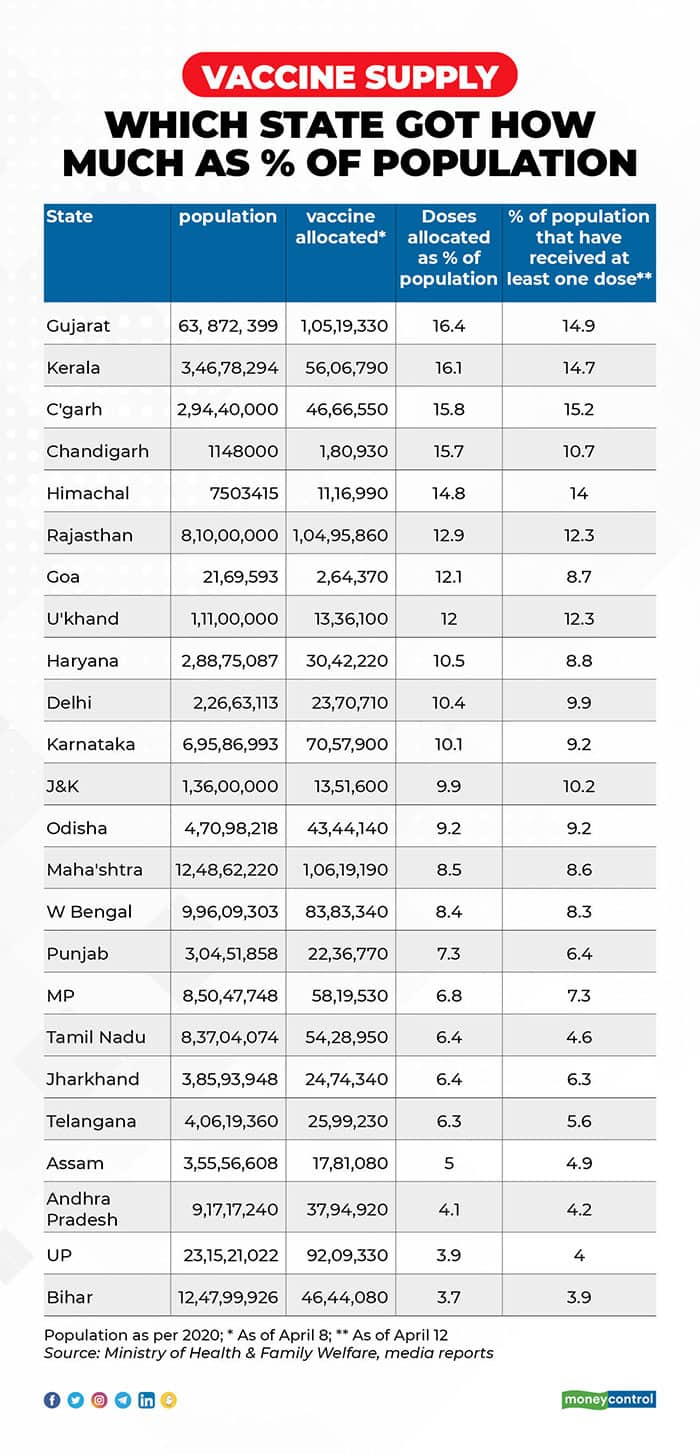



Is there a problem in the way the quantum of vaccine supply is decided for each state in India? In fact, how is it done?
These questions are increasingly being aired even as the second wave of COVID-19 goes on a rampage across the country. Several states continue to complain about vaccine shortage.
Hospitals in many states, including those in Delhi, Maharashtra, Karnataka and Chhattisgarh, have either run out of doses, or just have a few days of supply left.
The Government of India contends that the issue is not about supply, but of planning. "We are giving four days’ supply to the big states and replenishing it every four to five days. Small states get seven to eight days’ vaccine supply, which is replenished after that period. State governments need to see the status of doses on a daily basis, just like the exercise we do in the health ministry every day,” Health Secretary Rajesh Bhushan explained the methodology on April 14.
But one thing is still not clear. How is a day's supply calculated for each state? Is it same, or different, for each state?
Also, not all states agree with what Bhushan said. For instance, a Print report on April 14 quotes Chhattisgarh health minister TS Singh Deo alleging that the state hadn't got supplies "in last one week," despite being promised of fresh doses 'within two-three days.'
Chief ministers of Delhi and Maharashtra, the two most impacted states, have been vocal on their demands for more supply. This is despite Maharashtra continuing to get the highest number of doses.
No correlation with population?
One possible explanation of the mis-match between demand and supply, would be that the doses allocated to each state may not be in accordance with their population.
To understand better, Moneycontrol looked at the data of total doses supplied to 24 states and union territories in India, and compared this to their population. We also looked at the percentage of population that have received at least the first dose. Data for the rest of the states and union territories were unavailable.
We took the data from several sources. The data on vaccine administration was taken from the website of the Ministry of Health and Family Welfare. The ministry didn't have data on vaccine supplies to each state. A Health Ministry spokesperson said it did not have the data. We thus took data from media reports, including this report, which was partly corroborated by Minister Harsh Vardhan in this tweet.
What the data said
Though Maharashtra has been reporting the highest number of cases, and has been getting the biggest share in vaccine supplies, the picture changes when one takes into account its population.
As on April 8, the supplies to Maharashtra covered just about 8.5 percent of the population. For Delhi, it was 10.4 percent.
On the other hand, Gujarat, which can't be regarded as the most impacted state if one goes by official numbers, had got enough vaccines for 16.4 percent of its population - the highest. Kerala comes second with 16.1 percent and Chhattisgarh third with 15.8 percent.
Uttar Pradesh and Bihar, among the most populous states in the country, make up for the bottom of the table.

"The data surely shows there is a lack of logic or consistency in allocating doses. Maharashtra had a right to be upset," said an observer tracking the COVID-19 cases in India.
Another official said that the allocation may not be even in accordance to the incidence of COVID-19 infection.
And it's not that these states didn't have the capability, or the infrastructure, to administer more. Maharashtra, Odisha and West Bengal, for instance, have done a good job in administering the vaccines that was supplied them (See graph). Some others, including Gujarat, Chhattisgarh and Goa haven't been that successful.
The hope now is that the supply will get a boost with India approving the Sputnik V vaccine. Drugmaker Dr Reddy's had said it will be importing Sputnik V vaccine from Russia in this quarter, and supplies from Indian manufacturers will commence from next quarter. Also, the government has fast-tracked emergency approval for foreign-made jabs.
By then, observers hope, the supplies of vaccine will be commensurate with a state's population, and incidence of infection.
With inputs from Arup Roychoudhury.
Discover the latest Business News, Sensex, and Nifty updates. Obtain Personal Finance insights, tax queries, and expert opinions on Moneycontrol or download the Moneycontrol App to stay updated!
Find the best of Al News in one place, specially curated for you every weekend.
Stay on top of the latest tech trends and biggest startup news.